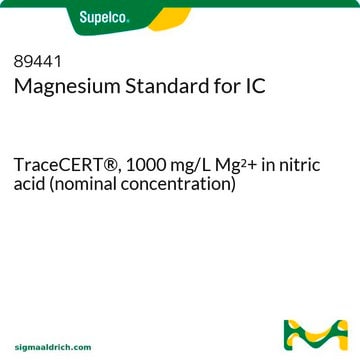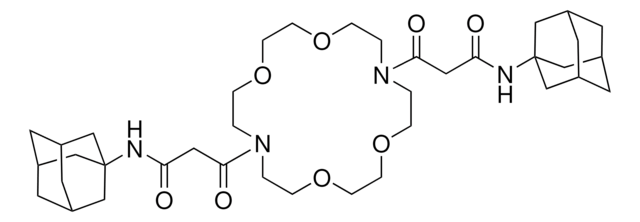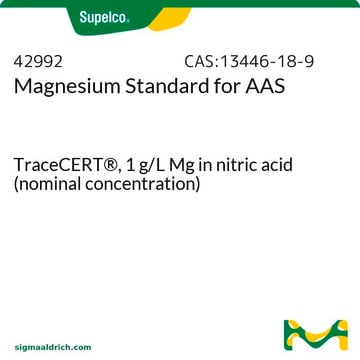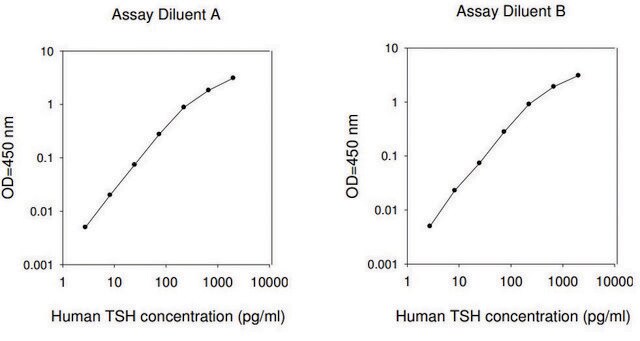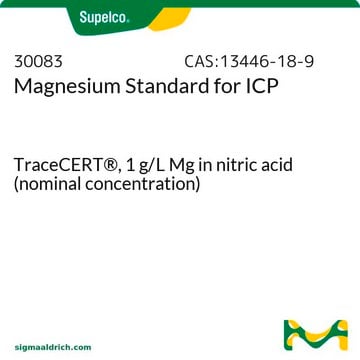63031
Magnesium ion solution for ISE
0.01 M Mg, analytical standard (for ion-selective electrodes)
Synonym(s):
Magnesium chloride solution
Sign Into View Organizational & Contract Pricing
All Photos(1)
About This Item
Linear Formula:
MgCl2
CAS Number:
Molecular Weight:
95.21
MDL number:
UNSPSC Code:
26111700
PubChem Substance ID:
Recommended Products
grade
analytical standard (for ion-selective electrodes)
shelf life
limited shelf life, expiry date on the label
concentration
0.01 M Mg
SMILES string
Cl[Mg]Cl
InChI
1S/2ClH.Mg/h2*1H;/q;;+2/p-2
InChI key
TWRXJAOTZQYOKJ-UHFFFAOYSA-L
Looking for similar products? Visit Product Comparison Guide
General description
Visit our Sensor Applications portal to learn more.
Preparation Note
prepared with MgCl2.6H2O and H2O
related product
Product No.
Description
Pricing
Storage Class Code
12 - Non Combustible Liquids
WGK
nwg
Flash Point(F)
Not applicable
Flash Point(C)
Not applicable
Personal Protective Equipment
dust mask type N95 (US), Eyeshields, Gloves
Choose from one of the most recent versions:
Already Own This Product?
Find documentation for the products that you have recently purchased in the Document Library.
Elaine T Lim et al.
PLoS genetics, 10(7), e1004494-e1004494 (2014-08-01)
Exome sequencing studies in complex diseases are challenged by the allelic heterogeneity, large number and modest effect sizes of associated variants on disease risk and the presence of large numbers of neutral variants, even in phenotypically relevant genes. Isolated populations
Stephen Q Wong et al.
Oncotarget, 6(2), 1115-1127 (2014-12-30)
Melanoma is often caused by mutations due to exposure to ultraviolet radiation. This study reports a recurrent somatic C > T change causing a P131L mutation in the RQCD1 (Required for Cell Differentiation1 Homolog) gene identified through whole exome sequencing
Hideyuki Arita et al.
Brain tumor pathology, 32(1), 22-30 (2014-04-22)
Assessment of the mutational status of the isocitrate dehydrogenase 1/2 (IDH1/2) gene has become an integral part of the standard diagnostic procedure and, therefore, needs to be accurate. This may, however, be compromised by various factors including the method of
Manal A Farg et al.
Human molecular genetics, 23(13), 3579-3595 (2014-02-20)
Intronic expansion of a hexanucleotide GGGGCC repeat in the chromosome 9 open reading frame 72 (C9ORF72) gene is the major cause of familial amyotrophic lateral sclerosis (ALS) and frontotemporal dementia. However, the cellular function of the C9ORF72 protein remains unknown.
Susanne Hellmuth et al.
The EMBO journal, 33(10), 1134-1147 (2014-05-02)
The universal triggering event of eukaryotic chromosome segregation is cleavage of centromeric cohesin by separase. Prior to anaphase, most separase is kept inactive by association with securin. Protein phosphatase 2A (PP2A) constitutes another binding partner of human separase, but the
Our team of scientists has experience in all areas of research including Life Science, Material Science, Chemical Synthesis, Chromatography, Analytical and many others.
Contact Technical Service